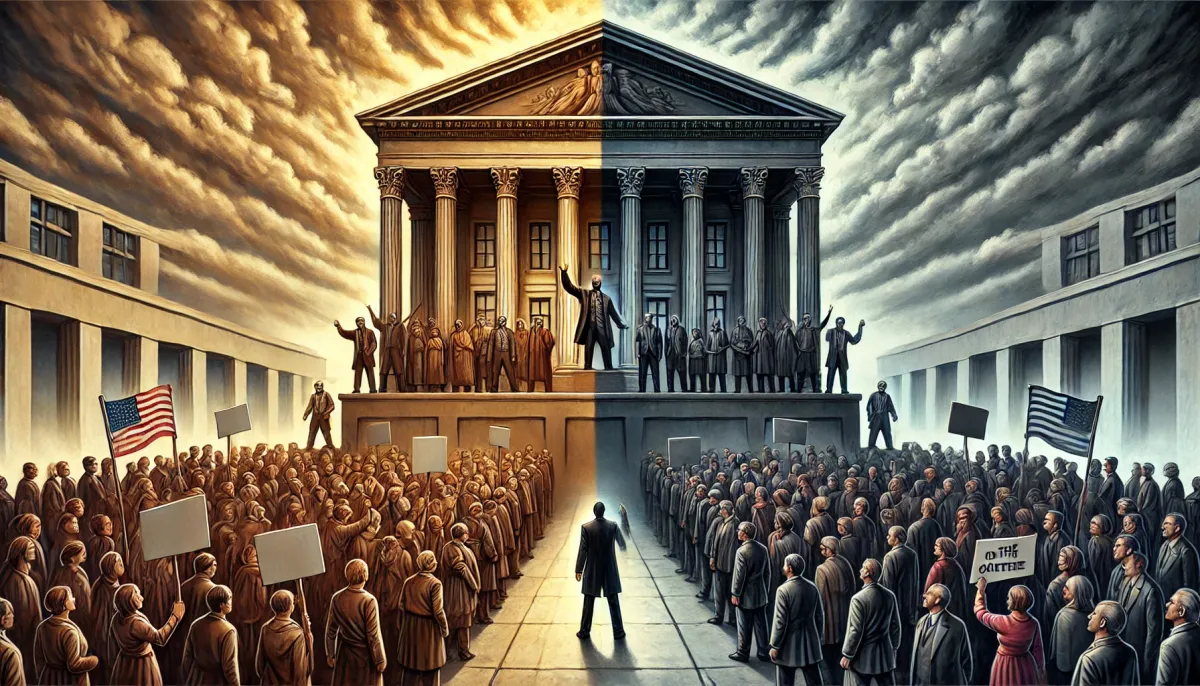The Forgotten Mandate of Government: A Divided Populace and the Pursuit of Power
The foundational principle, etched into the very fabric of the United States at its inception, has been forgotten in the modern era.

John Adams once wrote,
This foundational principle, etched into the very fabric of the United States at its inception, has been forgotten in the modern era. The pursuit of power and profit has overshadowed the common good, leaving a fractured populace struggling to reclaim its voice. While movements have risen to challenge the status quo, their efforts have often been neutralized by division, leaving the neoliberal agenda intact.
In the past two decades, the United States has witnessed a series of uprisings and movements, each born out of frustration with systemic inequality, corruption, and injustice. The Occupy Wall Street movement of 2011 sought to expose the vast economic disparities between the 1% and the 99%, calling attention to the unchecked power of corporations and the wealthy elite. Similarly, Black Lives Matter (BLM) emerged as a response to systemic racism and police brutality, demanding justice and accountability for marginalized communities. On the other side of the political spectrum, the Tea Party movement arose in opposition to government overreach and fiscal irresponsibility, reflecting a deep-seated distrust of centralized power.
These movements, though ideologically diverse, share a common thread: they are reactions to a government that has failed to prioritize the common good. Yet, rather than uniting around shared grievances, these groups have often been pitted against one another, goaded into opposition by political and media forces that thrive on division. This polarization has allowed the status quo to persist, with neoliberal policies continuing to dominate the political landscape.
Neoliberalism, with its emphasis on deregulation, privatization, and free-market capitalism, has eroded the social contract that once bound Americans together. Public goods like healthcare, education, and infrastructure have been sacrificed on the altar of profit, leaving millions of citizens struggling to meet their basic needs. Meanwhile, the wealthy and powerful have consolidated their influence, further entrenching inequality and undermining democracy.
In contrast, other nations have demonstrated the power of unified, productive protests to create real change. In South Korea, mass protests in 2016-2017 led to the impeachment of President Park Geun-hye, a stunning example of accountability in action. In France, the Yellow Vest movement forced the government to address economic inequality and make concessions to the working class. And in Hong Kong, protesters have shown remarkable resilience in their fight for democracy and autonomy, even in the face of brutal crackdowns by the Chinese government.
What sets these movements apart is their ability to transcend ideological divides and unite around a common cause. In the United States, however, such unity has been elusive. The deeply entrenched divisions within the populace have allowed those in power to maintain control, using fear and misinformation to keep citizens at odds with one another. This strategy of divide and conquer has been remarkably effective, ensuring that no single movement gains enough momentum to challenge the neoliberal order.
This division created and empowered the source of political control in the USA that allowed the neoliberal policies to proliferate globally, The USA was once looked to as a "great hope" the American dream once avowed to but today it has been corrupted into a weight that holds down and sometime demolishes countries.

Today the USA acts as a bucket of crabs, each holding down the other as we head towards harvest.
The question, then, is how to move forward. How can Americans rediscover the mandate of government as articulated by John Adams? The answer lies in recognizing the shared struggles that unite us, rather than the differences that divide us. Economic inequality, systemic racism, environmental degradation, and the erosion of democratic norms are issues that affect all Americans, regardless of political affiliation. By focusing on these common challenges, we can begin to build a coalition that transcends partisan divides and demands a government that truly serves the common good.
This will not be easy. The forces of division are powerful, and the entrenched interests that benefit from the status quo will not relinquish their power without a fight. But history has shown that when people come together around a shared vision of justice and equality, they can achieve remarkable things. The civil rights movement, the labor movement, and the women's suffrage movement are all examples of what is possible when citizens unite in pursuit of a better future.
As we look to the future, we must remember the words of John Adams and hold our government accountable to its true purpose. The protection, safety, prosperity, and happiness of the people must take precedence over the profit and power of the few. Only by reclaiming this forgotten mandate can we hope to create a society that truly serves the common good.
